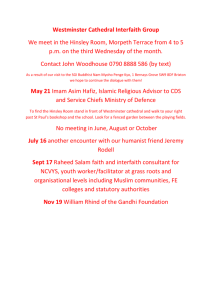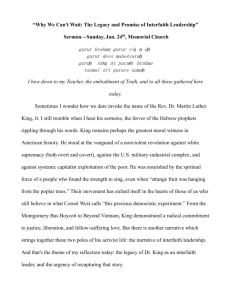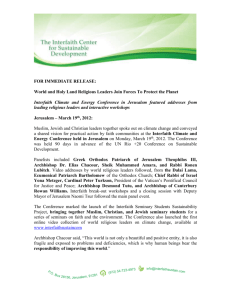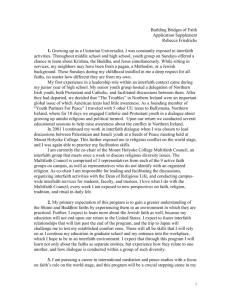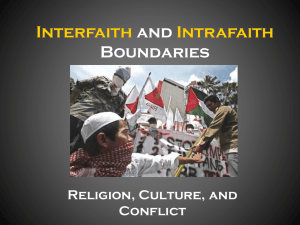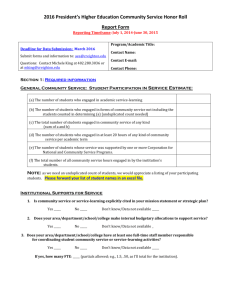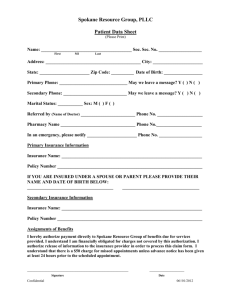GERMANACOS FELLOWSHIP - Interfaith Youth Core
advertisement
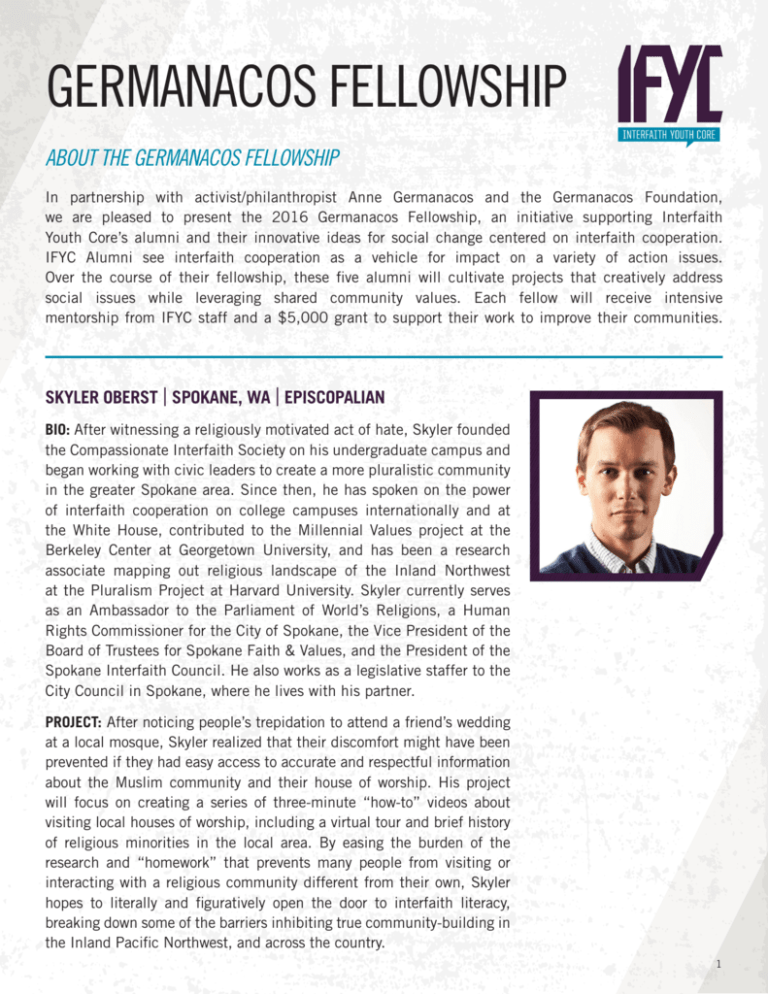
GERMANACOS FELLOWSHIP ABOUT THE GERMANACOS FELLOWSHIP In partnership with activist/philanthropist Anne Germanacos and the Germanacos Foundation, we are pleased to present the 2016 Germanacos Fellowship, an initiative supporting Interfaith Youth Core’s alumni and their innovative ideas for social change centered on interfaith cooperation. IFYC Alumni see interfaith cooperation as a vehicle for impact on a variety of action issues. Over the course of their fellowship, these five alumni will cultivate projects that creatively address social issues while leveraging shared community values. Each fellow will receive intensive mentorship from IFYC staff and a $5,000 grant to support their work to improve their communities. SKYLER OBERST | SPOKANE, WA | EPISCOPALIAN BIO: After witnessing a religiously motivated act of hate, Skyler founded the Compassionate Interfaith Society on his undergraduate campus and began working with civic leaders to create a more pluralistic community in the greater Spokane area. Since then, he has spoken on the power of interfaith cooperation on college campuses internationally and at the White House, contributed to the Millennial Values project at the Berkeley Center at Georgetown University, and has been a research associate mapping out religious landscape of the Inland Northwest at the Pluralism Project at Harvard University. Skyler currently serves as an Ambassador to the Parliament of World’s Religions, a Human Rights Commissioner for the City of Spokane, the Vice President of the Board of Trustees for Spokane Faith & Values, and the President of the Spokane Interfaith Council. He also works as a legislative staffer to the City Council in Spokane, where he lives with his partner. PROJECT: After noticing people’s trepidation to attend a friend’s wedding at a local mosque, Skyler realized that their discomfort might have been prevented if they had easy access to accurate and respectful information about the Muslim community and their house of worship. His project will focus on creating a series of three-minute “how-to” videos about visiting local houses of worship, including a virtual tour and brief history of religious minorities in the local area. By easing the burden of the research and “homework” that prevents many people from visiting or interacting with a religious community different from their own, Skyler hopes to literally and figuratively open the door to interfaith literacy, breaking down some of the barriers inhibiting true community-building in the Inland Pacific Northwest, and across the country. 1 NADIAH MOHAJIR | CHICAGO, IL | MUSLIM BIO: As the co-founder & Executive Director of HEART Women & Girls, Nadiah is constantly thinking of new and creative ways to bring public health best practices to faith-based communities. In just five years she has led HEART to provide sexual health education programming, curriculum development, and advocacy for over 2,000 Muslim women and girls in the Chicagoland area, as well as in several other cities across the country. HEART has received national recognition for its work toward breaking cultural barriers and raising awareness about important issues such as sexual and reproductive health and sexual violence. Nadiah received her Master’s in Public Health from the University of Illinois at Chicago, and lives on the South Side of Chicago with her three children and husband. PROJECT: Sexual violence is a serious problem and unfortunately too common with nearly 1 in 6 women being victims of sexual violence in their lifetime, and faith communities are not immune to this prevalence. While there are many challenges to addressing this issue in faith communities and supporting survivors in a way that is culturally-sensitive, there are also many opportunities. Currently, there is a shortage of professionals trained to serve the unique and nuanced needs of Muslim survivors of sexual assault. Nadiah’s project aims to build this capacity by partnering with sexual violence experts from other faith communities to share lessons learned and work together to build safer communities and ultimately prevent sexual violence. She will work to host a training targeting educators, community and religious leaders, and other professionals to increase the number of culturally competent trained professionals to serve survivors of sexual assault in the Muslim community and other faith communities. 2 RABBI JOSHUA STANTON | SHORT HILLS, NJ | JEWISH BIO: Rabbi Joshua Stanton serves Congregation B’nai Jeshurun in Short Hills New Jersey and is co-founder of Tribe, a community for Millennial Jews in New York City, connected to his synagogue. He represents the Central Conference of American Rabbis on the International Jewish Committee for Interreligious Consultations, which liaises with the Vatican and other international bodies. Josh’s work with IFYC as a college student inspired him to co-found the Journal of Inter-Religious Studies, State of Formation, and Religious Freedom USA and to “stay spicy” in all areas of his professional life. His articles have been published in nine languages, and he has given talks about interfaith work around the world, from the White House to Qatar, from Jerusalem to Kosovo. He is the lucky husband of Mirah Curzer and takes pride in living out a truly egalitarian marriage. PROJECT: The greater New York City region is home to both the largest Jewish and the largest Muslim population in the United States, yet the leadership from both communities interact far too rarely. Josh hopes to change this through the launch of a mosque-synagogue twinning program and leadership conference, focused on combatting the rise of both anti-Semitism and Islamophobia. His project will rely on community-organizing techniques, strong relationships between lay and clergy leaders and, in turn, the respective congregations, addressing the key question of how lives, communities, and religious experiences could be furthered through collaboration. 3 BENJAMIN MARCUS | WASHINGTON, DC | UNAFFILIATED BIO: Ben is a Research Fellow at the Newseum Institute and Coordinator for Global Covenant Partners, a nonprofit committed to preventing and reducing religion-related violence. He has developed religious literacy education opportunities for DC Public Schools, The Foundation for Religious Literacy, the Office of Religion and Global Affairs at the U.S. State Department, the U.S. Embassy to the Holy See, the Bureau of Conflict and Stabilization Operations at the U.S. State Department, Interfaith Youth Core, and the Cambridge Inter-Faith Programme. Most recently, Ben served as executive editor of the 2015 White Paper of the Sub-Working Group on Religion and Conflict Mitigation of the State Department’s Religion and Foreign Policy Working Group. Ben earned a Master’s of Theological Studies as a Presidential Scholar at Harvard Divinity School. In his free time Ben likes to cook and play the saxophone. ARPAN CHOKSHI | CHICAGO, IL | HINDU BIO: Arpan Chokshi is a Social Studies teacher at Hinsdale Central High School. After earning his BA, Arpan studied comparative philosophy and religion in India and later pursued his MA in Teaching & Curriculum. Arpan has long been an advocate for interfaith cooperation, leading religious roundtable discussions for his peers in high school and service projects as an undergraduate. Currently, Arpan teaches World Cultures, Economics and US History while also helping teachers integrate technology in the classroom. For leisure, he enjoys long runs, reading and spending time in nature. Arpan credits his close ties with Indian culture to his parents who always encouraged him to understand the reasoning behind rituals. Arpan’s interest in religion stems from his spiritual family which has motivated him to strive to see the divinity in all. Read about Benjamin Marcus and Arpan Chokshi’s complementary project on page 5. 4 PROJECT: American public schools need engaging, legal, vetted lesson plans about religion. American public school students need resources that explain how to legally engage in inter-religious dialogue outside of the classroom. Arpan and Ben’s complementary projects will engage public school teachers in the production and dissemination of high quality modular unit and lesson plans about religion for and by public school teachers and create toolkits for supporting and facilitating curricular and cocurricular discussions about religion at the high school level. Ben’s project will create lessons about religion for public secondary school audiences that are aligned to the Common Core. These lessons will provide students with an understanding of core concepts and basic components of religious identity and the skills necessary to talk about religion throughout history and within different communities. These modules will function equally as standalone lessons or as lessons to be inserted into larger units in literary arts, history, or social studies courses. Through these lessons students will learn how the active exchange between different religious communities shapes our shared world. Too often students and teachers are reluctant to discuss religion in public schools. Although there are legitimate legal limitations, many times students, teachers, and administrators hesitate to talk about religion because they lack clear guidelines on whether they can talk about religion, how they can talk about religion, and where to find accessible material on religious topics. By collaborating with other educators, Arpan hopes to develop two sets of toolkits. One will provide resources that explain how public school teachers can facilitate conversations about religion in public school classrooms—especially during English, history, and social studies lessons—that allow but do not force students to speak from their own backgrounds, religious or not. Another set will provide resources for students interested in creating student-led, student-initiated co-curricular clubs that promote interfaith dialogue. 5
